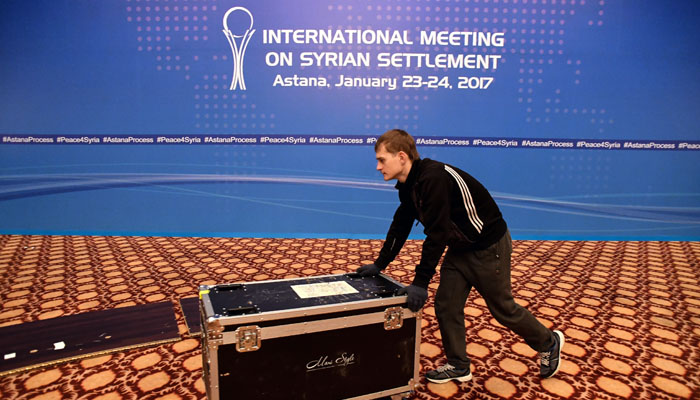The warring sides in Syria’s six-year-old civil war met for talks in Kazakhstan’s capital of Astana on Monday after the leaders of Russia, Turkey and Iran promised to be guarantor states for the talks.
The Astana talks, scheduled to end on Tuesday, are the first time in which the opposition and representatives of Syrian President Bashar al-Assad have come together since UN-brokered talks in Geneva.
According to a statement from the Kazakhstan Foreign Ministry on Sunday, the talks were to start at 1 p.m. (7 a.m. GMT) on Jan. 23 in Astana and were scheduled to end in the afternoon of Jan. 24.
There are no senior government figures among the delegations, with Deputy Undersecretary of the Turkish Foreign Ministry Sedat Önal representing Turkey and Russia’s Special Envoy on Syria Alexander Lavrentiev and Russian Deputy Foreign Minister Mikhail Bogdanov representing Russia.
While Syria’s UN Ambassador Bashar al-Jaafari, an experienced negotiator involved in the failed talks in Geneva, will head the regime delegation, Mohamed Alloush of Jaish al-Islam (Army of Islam) will head the Syrian opposition’s delegation at the talks. He will lead a “military delegation” of around 14 people, in addition to 21 legal and political advisers from the opposition High Negotiations Committee (HNC) umbrella group.
UN Envoy for Syria Staffan de Mistura, Kazakh Foreign Minister Kairat Abdrakhmanov, Iran’s Deputy Foreign Minister Hossein Jaber Ansari, US Ambassador to Astana George Krol and representatives of France, Britain and the EU will also participate in the talks.
In December, after Russian President Vladimir Putin and his Turkish counterpart, Recep Tayyip Erdoğan, discussed with Kazakh President Nursultan Nazarbayev the possibility of holding a meeting in Astana between the warring parties in the Syrian conflict, Putin said the leaders of Turkey, Iran, Syria and Russia were prepared to start peace talks.
The Turkey-Russia brokered Aleppo truce, which began in Syria on Dec. 30 to pave the way for the new peace talks, excluded terror groups such as the Islamic State in Iraq and the Levant (ISIL) and Jabhat Fateh al-Sham.
Kurdish rebel groups the Kurdish Democratic Union Party (PYD) and its armed wing the People’s Protection Units (YPG), which control most areas of northern Syria, are being excluded from the talks in line with the wishes of Turkey.


